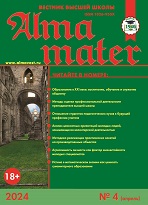https://doi.org/10.20339/AM.11-18.018
A.L. Kuzevanova is Dr.Sci. (Sociology), doc., head of sub-faculty e-mail: angelina2000@list.ru; and A.I. Vagabova is master student e-mail: alena-vagabova@mail.ru
at Volgograd Institute of Management — branch of RANKHiGS under the President of the RF
Presented is analysis of results of comprehensive sociological survey, aimed at identifying principal characteristics of the process of “McDonaldization” in contemporary Russian higher education. Described is characteristic of the notion of “McDonaldization” of higher school. The authors come to the conclusion, that being “McDonaldizated”, higher school under contemporary Russian conditions is being influenced by principal formal principles, connected with requirements of standardization of educational process and the system of evaluation of educational achievements of students, as well as accentuation attention on quantitative indexes, and also with formation of conditions for creating effect, with help of which are being compared sociological data, obtained as result of questionnaire survey and in-depth interviews with students and university professors.
Key words: higher school, higher education, “McDonaldization”, formal rationality, efficiency, predictability, dehumanization of education, standardization.
References
- Ritzer, J. MacDonaldization of Society. Moscow, 2011.
- Smakotina, N.L. Transformation of education under conditions of globalization: Opportunities and Risks. Values and Meanings. 2017. Pp. 21–28.
- Oskolova, T.L. Globalization and higher education: the path to world citizenship or the loss of national identity? Education and science. 2014. No. 1 (110). Pp. 28–43.
- Tkhagapsoev, H.G. To strategies for the development of education in modern Russia. Humanitarian of the South of Russia. 2013. No. 1. Pp. 103–119.
- Saganenko, G.I. The study of the educational sphere at the macro level (results of one content analysis). Higher education in Russia. 2012. No. 8–9. Pp. 81-90.
- Kalinina, N.N., Sapunov, M.B., Tebiev, B.K. Transformations of the university idea: challenges of time and responses of the academic community. Economics of Education. 2012. No. 4. Pp. 13–29
- Filippov, R.I. McDonaldization education: is it suitable for Russia? Higher education in Russia. 2010. No. 3. Pp. 123–128.
- Rybakova, M.V., Pivovarova, M.B. Motivation of students for scientific activity under conditions of formation of a new paradigm in education. Successes in chemistry and chemical technology. 2017. No. 2 (183). Pp. 43–45.
- Morozova, G.V. Estimating of reforms in education system of Russia by students. Proceedings of Saratov university. 2013. No. 1. Pp. 81–85.
- Barber, M., Donelly, K., Rizvi, S. An avalanche is coming. London, 2013.
- Banks, J.A. Educating citizens in multicultural society. New York, 2010.
- Loader, R., Hughes, J. Balancing cultural diversity and social cohesion in education: the potential of shared education in divided contexts. British journal of educational studies. 2017. No. 1. Pp. 3–25.
- Herman, E., Stefanescu, D. Can higher education stimulate entrepreneurial intentions among engineering and business students? Educational studies. 2017. No. 3. Pp. 312–327.











.png)






